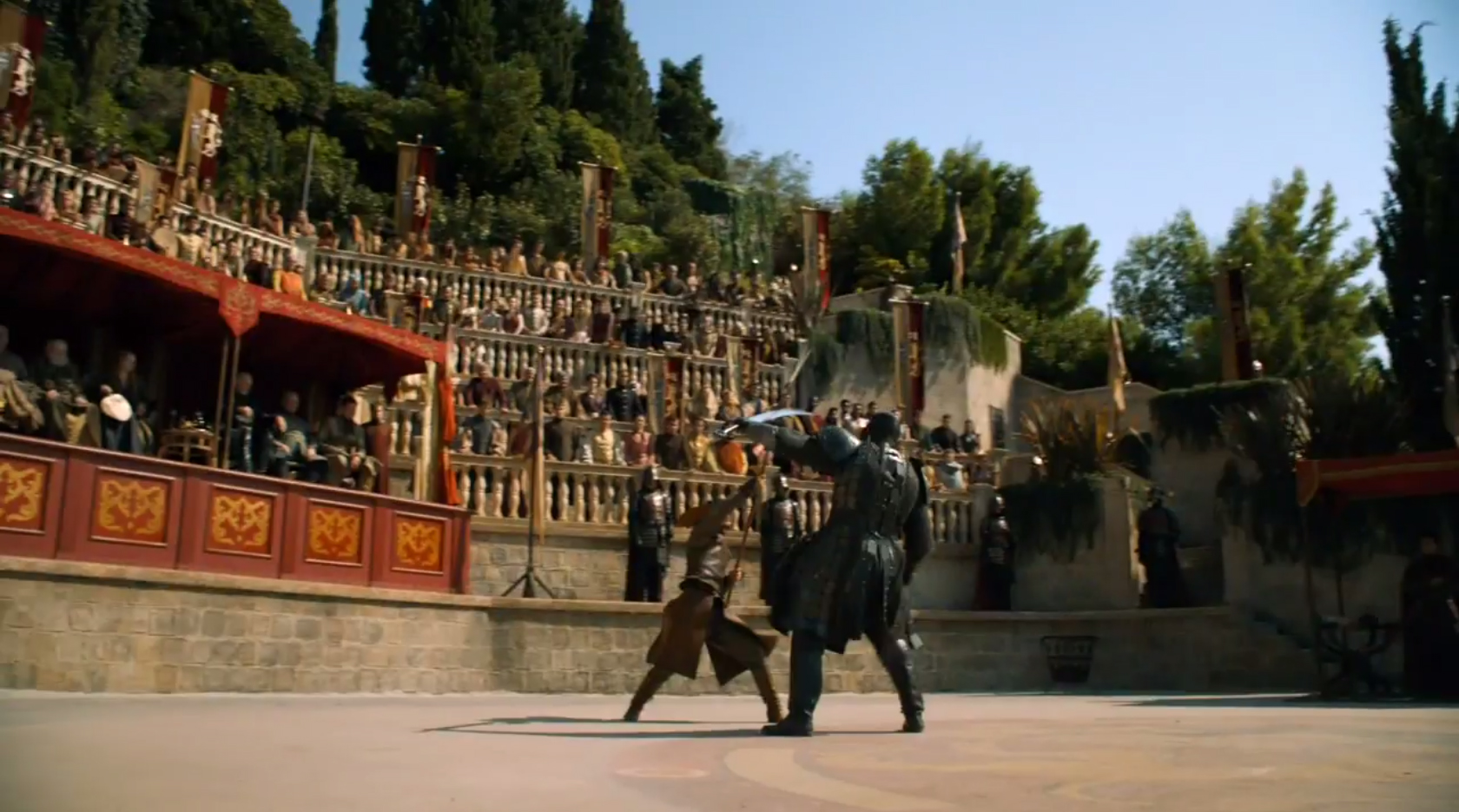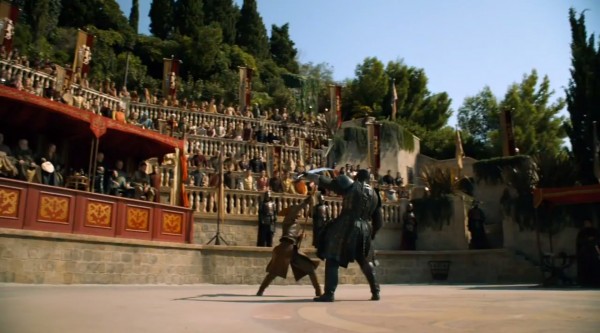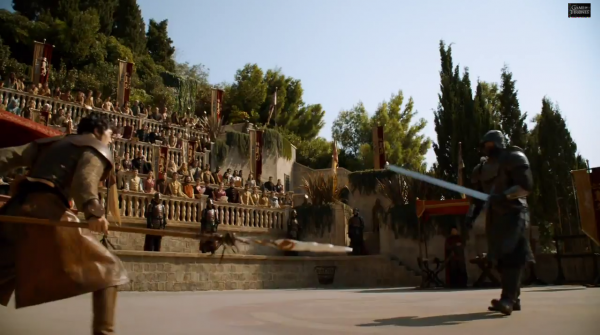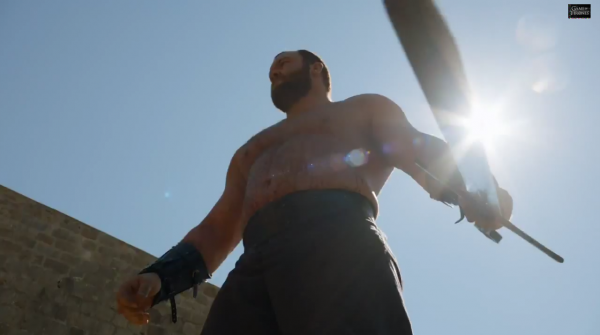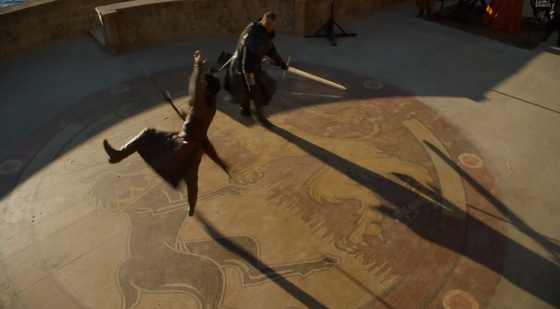ALERT: Spoilers below for those not caught up on Season 4 of Game of Thrones.
Many Game of Thrones fans know what a student of history author George R.R. Martin is: Many of the plot’s themes have echoes in the War of the Roses and other historic events.
Sunday’s bloody fight between the Mountain and Viper was one of the most intense television events of the year, and the ending shocked more than a few people. The fight echoes actual medieval history, says Longwood University history professor Dr. Steven Isaac.
The Brutal Finish
Iron Herman vs. Guy of Steenvoorde, 1127-28
Did you see that finish coming? The Viper was clearly the better fighter, and ready to avenge his sister when the Mountain found a way to win. The fight echoes a 12th century text: Recorded in 1127-28 by Galbert of Bruges, Iron Herman fought Guy of Steenvoorde in a brutal trial by combat.
Guy has the better of the fight, unhorsing Herman early and toying with him (didn’t we all just want the Viper to end the fight quickly—at least Tyrion did). Herman was eventually on the ground and seemingly finished—Guy was preparing to deliver the coup de grace, as the Viper was Sunday night—when Herman saw a brutal path to victory: He reached up and grabbed Guy between the legs with so much force to the point that Guy gave up, and Herman was declared the winner of the fight.
Stephen of Massy vs. Monks of Saint-Germain-des-Pres, 1150s
When he was on the ground and dying, should the Mountain have conceded defeat, or was he justified in doing anything he could to win the fight in the end? King Louis VII ordered a judicial duel to solve an ongoing complaint between Stephen of Massy and the monks of Saint-Germain-des-Pres. A charter written by one of the monks records the bloody combat—the monks’ champion eventually won by gouging out Stephen of Massy’s champion’s eye.
Pinabel vs. Thierry, 1040-1115
Turns out, the fight’s brutal ending also has echoes in a French work from the late 11th century to the early 12th century. In the climactic final duel in The Song of Roland, the oldest surviving major work of French literature, Ganelon’s guilt is established when his champion, Pinabel, is killed by a single brutal stroke from Thierry. Thierry cleaves Pinabel’s iron helmet in two, and Ganelon is sentenced to a painful death. In addition, in Geoffroy of Monmouth’s History of the Kings of Britain, King Arthur kills Frollo with a single mighty stroke—the same type of strength on display Sunday night.
The Spear in the Side
Bernier vs. Gautier, 12th-13th Century
Who can forget Oberyn Martell’s pole-vault over the Mountain, leaving his spear in the giant’s stomach? In an epic poem by Raoul de Cambrai, champions Bernier and Gautier fight in an epic single combat. Gautier eventually has a spear embedded in his side but continues to fight—landing a monumental blow that takes off six inches of Bernier’s face (including an ear)—before the fight is stopped.
Armor and Sword vs. Leather and Spear
We all know it’s fantastical fiction, but would a much smaller man wearing only boiled leather and wielding a spear EVER have been allowed to fight a giant of a man in heavy plate wielding a giant broadsword? According to Isaac, probably not.
Parity of combatants was the norm for the Middle Ages in fact, it was legislated in Lombardy that duelists fight with just a shield and club. Later, more elaborate weapons were allowed but equality of armor and weapons was expected (even the mutual sharpness of swords was legislated). In one example, the abbess of Ronceray, in a property dispute, declared herself ready to throw anyone in the ring, and when her opponents chose a blacksmith, she did the same.
In actuality, trials by combat were very rare.
 A first glance at medieval documents makes it seem that trials by combat were the preferred solution almost everywhere. Not the case. Contenting litigants had no interest in fighting, or having someone else fight, and proposing a trial by combat was used as a bargaining chip in negotiations rather than a final solution.
A first glance at medieval documents makes it seem that trials by combat were the preferred solution almost everywhere. Not the case. Contenting litigants had no interest in fighting, or having someone else fight, and proposing a trial by combat was used as a bargaining chip in negotiations rather than a final solution.
Trials by ordeal (fire, water, combat, etc.) were far less practiced than generally thought. Only half of the ordeals proposed ever went the distance of being undertaken, and, for actual combats, the percentage falls to 1-in-7.
But, as we know, in the end, all men must die. Even the Viper.
Related:
Dr. Steven Isaac’s Full Essay on Game of Thrones and the Mountain-Viper Duel
Game of Thrones promotional images courtesy of HBO.
